Personalization Platform
Personyze is a robust set of tools that empower online marketers to create dynamic and optimized online experiences, all in one easy-to-use platform. No IT, coding, or technical expertise required.
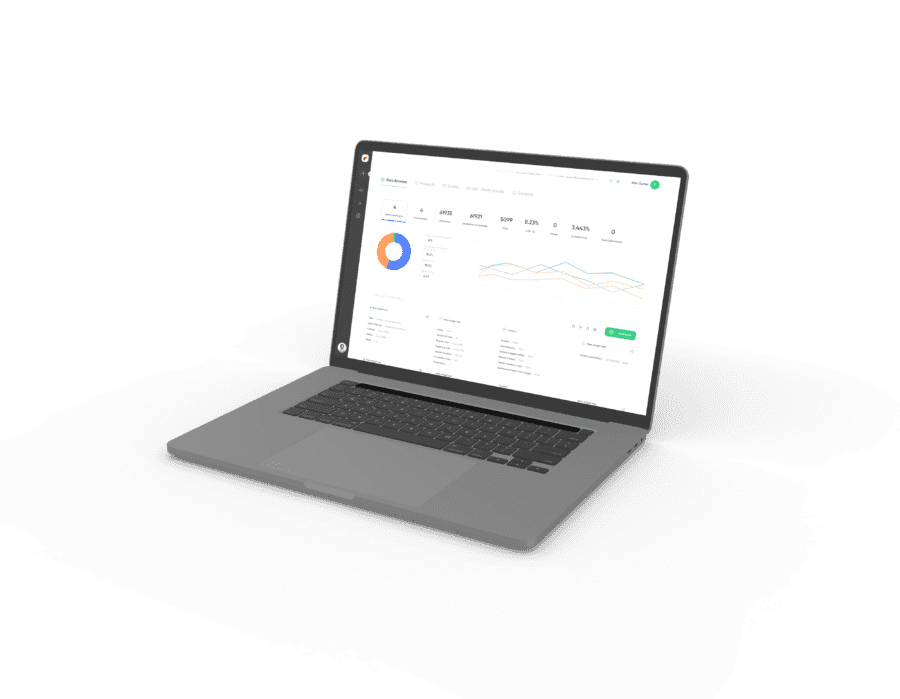
Data
Combine real-time visitor data from multiple sources for a unified visitor profile.
Logic
Decide what the personalized experience will be based on segmentation and AI.
Action
Execute the personalized experience in website, emails, and apps.
Segmentation engine
Show segmented content to your visitors using 70+ visitor data characteristics.
By default, Personyze is automatically tracking 70+ user attributes from the user’s session for behavioral targeting, these include virtually any trackable behavior, location which is derived from IP, weather at that location, and other details like URL variables and cookies.
Current session or cart data
Personyze is able to “grab” or scrape data from any tracked page element on the site, such as a search bar, login field, or current cart value, and show specific targeted content based on this data.
Referral or Traffic sources
Targeted content can also be shown based on the source of the visitor’s referral, such as Google, LinkedIn, or Facebook ad campaigns, or referring websites.
Most popular interests
Show targeted content based on the visitor’s most visited pages, as well as their ranked interests from product/content interactions.
Geo location and zip code
Our system knows the visitor’s location based on IP intelligence, and therefore also knows the current weather forecast for that location in detail. You can include or exclude visitors from various cities, regions, and countries in your campaigns, as well as based on aspects of their weather such as temperature and precipitation.
Companies & organizations
Personyze is able to reference a registry of IP addresses which are associated with various companies, allowing you to show specific messages to visitors browsing from computers/networks associated with specific companies. For more extensive data, you can integrate third-party data services like Albacross or Clearbit.
CRM Data
By uploading or synchronizing your CRM data, you can utilize any custom data point you can imagine for targeting, including industry, company name, position in funnel, account type, etc.
System
You can show specific content to visitors with certain system characteristics, such as desktop vs mobile, browser type, or browser language.
Site behavior
You can utilize various behaviors on the site to identify a visitor’s interests and target them with personalized content, including most popular page, whether or not they visited a list of pages, or the time that they entered the site, among many more.
Behavioral targeting rules and logic can be as simple or as complex as you want them to be. Create incredibly simple campaigns such as showing content only to new visitors, or only to those who have displayed complex combinations of behaviors and attributes. You can also set conflicting campaigns to have a hierarchy and mutual exclusivity.
Personyze is extremely flexible in how it can integrate user data for targeting, so that virtually any CRM or external database can be integrated. This allows you to expand your targeting capabilities to any data variables you might have, such as the visitor’s role in their company, industry, account type, budget, or anything you have.
Turnkey integration with CRM and CDP providers like HubSpot, Zoho, Segment, allow you utilize any custom data point you can imagine for behavioral targeting, including industry, company name, position in funnel, account type, etc.
Turnkey integration with third-party ABM data providers Leadfeeder, Albacross and Clearbit allow you to gain access to valuable B2B data for targeting based on IP intelligence, such as the visitor’s company association, industry, revenue, company name, etc.
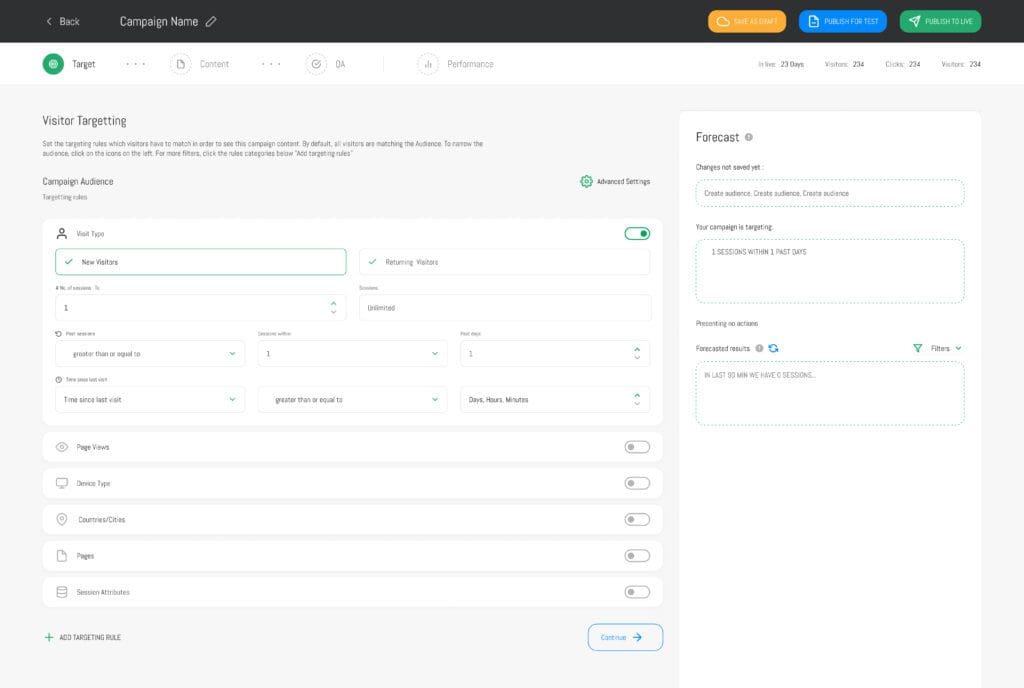
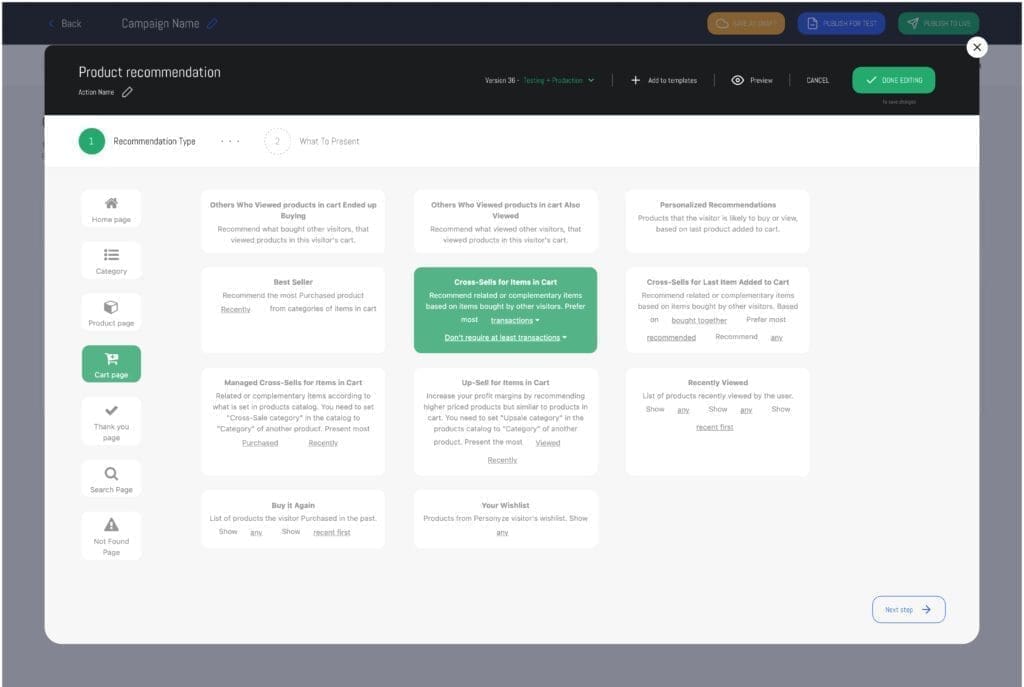
Recommendation Engine
Harness the power of AI to recommend the content and/or products that each visitor is most likely to be currently interested in, on website, emails, and apps.
Product recommendation algorithms are specifically designed for various pages and scenarios, with a variety of algorithms for the homepage, product pages, cart page, and more.
Recommended for you
This machine learning-based algorithm uses the totality of user data to find patterns in how users of various types interacted with all of the items in your catalog.
Frequently bought together:
Recommend cross-sale items that were bought together often with the product they’re currently viewing, have in their cart, or have recently purchased.
Show those who viewed this also viewed/bought:
Suggesting the right alternatives, based on similarity or crowd data, will increase the number of products viewed and time spent in a convenient shopping flow.
Those who bought from this category also bought:
Recommend items frequently bought from other categories by customers who bought from the category they are viewing or just purchased from.
New in stock
Help customers stay up-to-date on items that are new on your shelves, with the option to fine-tune for items added to the site in the last 7 days, before the last visitor, or based on visitor’s interests.
View it again/buy it again
Show the items they recently viewed or bought, so they can pick up where they left off, or items they bought in the past so they can easily resupply.
Further fine-tune the recommendation with filters:
- Discount = greater or less than X%
- Product feed attributes, such as interest, color, brand, or price.
- If they are within X miles of distribution centers’ location, offer free shipping
- Visitor’s gender, age, client type, industry, etc.
- Show that there are less than X units in stock
ontent recommendation engine algorithms are specifically designed for various pages and scenarios, with a variety of algorithms for the homepage, article pages, search page, and more.
Those who read this also read this
Shows visitors on a content page what other posts have been most popular among other visitors who read the current post.
Most popular/commented from this category or Topic
Shows the visitor the most viewed, commented, favorited etc. content from the same category or topic as the content currently being viewed.
Inspired by you recent reading
This recommendation will show a list of most popular content based on those categories most recently read by the visitor.
Trending now content
This recommendation will show the content that is most popular recently.
Demographic or CRM
When you have demographic information on visitors, such as gender or age, you can show items that were popular among their similar demographic. Demographic/CRM variables can be any custom variable you have on your visitors.
Those Who Read This Bought These Products
This recommendation is good for guide and info pages, and shows products frequently bought by visitors who read the same content currently being read.
Most Popular Content from Visitor’s Favorite Author/Topic
This will show the visitor the most viewed/commented/liked content from their most read author/topic on the site.
Personyze’s recommendation engine can equally be employed for email recommendations. Here are a few of our popular email algorithms.
Now on sale from past interests/left in cart
This recommendation shows the visitor items that have recently changed in price, based on what they previously interacted with or left in their cart.
Cart abandonment email drip
This type of email recommendation reminds the visitor of items they left in their cart, as well as recommends similar items, in emails sent at intervals determined by you.
Time to resupply
This recommendation type reminds the visitor to re-stock perishable items, and can be sent only at certain intervals determined by you.
Most recommended for you
This email recommendation uses machine learning to detect patterns in the crowd data, and based on the visitor’s characteristics will show them what they are most likely to be interested in.
Cross-Sell Based on Last Purchase
This email recommendation suggests items which other visitors who made the same purchase as this visitor did recently also bought, or items which have a cross-sale association in the catalog with the visitor’s most recent purchase.
Newly listed items/accessories for you
This email recommendation will suggest items to the visitor that have been newly added, which go together with items previously purchased.
Send my cart to my email button
This button on the site allows the visitor to opt-in for their cart to be sent to their email, as a reminder. If their email is not known yet, it can trigger an email form to be launched in the form of a popup, and once collected this email can then be used for other remarketing emails, as well.
AB testing
A/B testing is available on any piece of content created or edited by Personyze. Any change or set of changes can be tested, using two or more testing groups, optional control groups, and various rotation settings. You can review detailed statistics on the test results, including statistical significance to help you determine the winner.
Set Personyze to rotate the testing groups by user, by sessions, or by page refresh. Include controls groups if you want to, and choose what percentage of your audience will see each test group. Set the winning test group to automatically be applied to all visitors in the segment, once statistical significance is achieved.
Achieve a greater precision, avoid data pollution, and reduce testing time by using segmentation to test within targeted groups of visitors, with optional control groups. Test rapidly on the same testing group over and over again, until you reach perfection.
See detailed analytics on the performance of your A/B test, including filtering the data by variables such as location or demographics (if known).
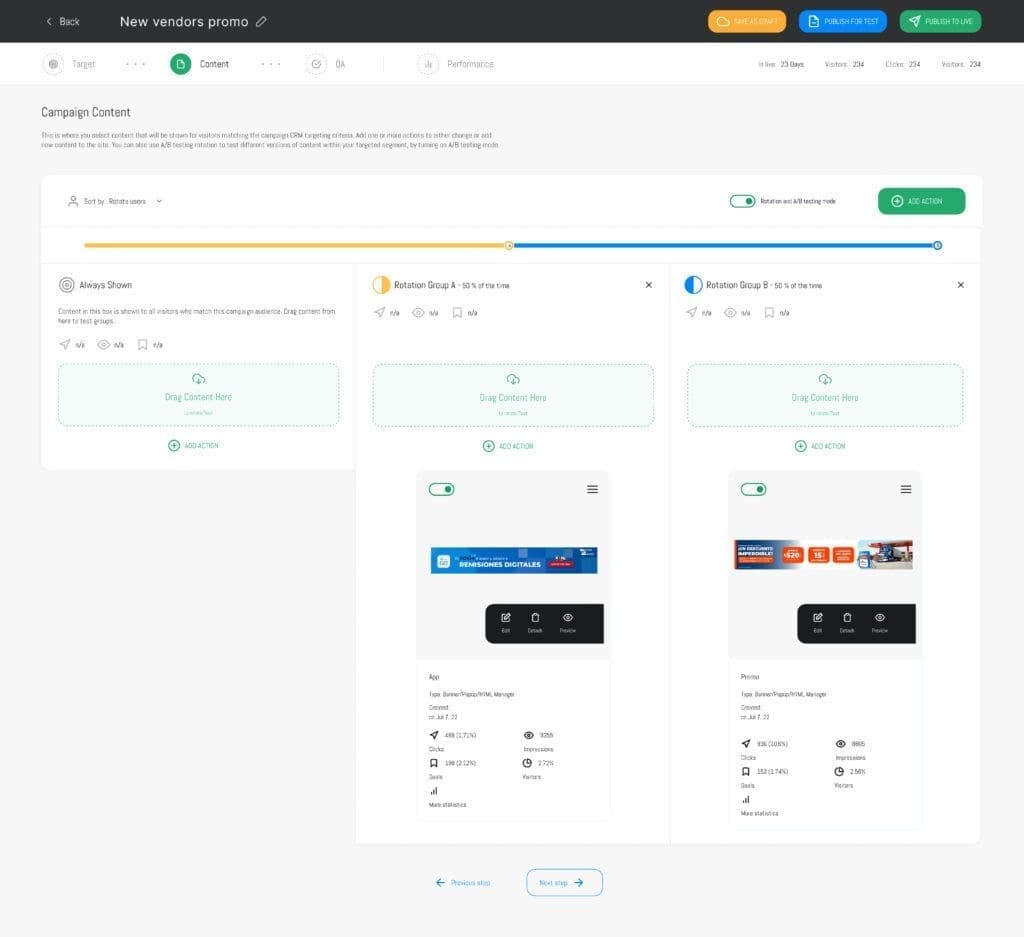
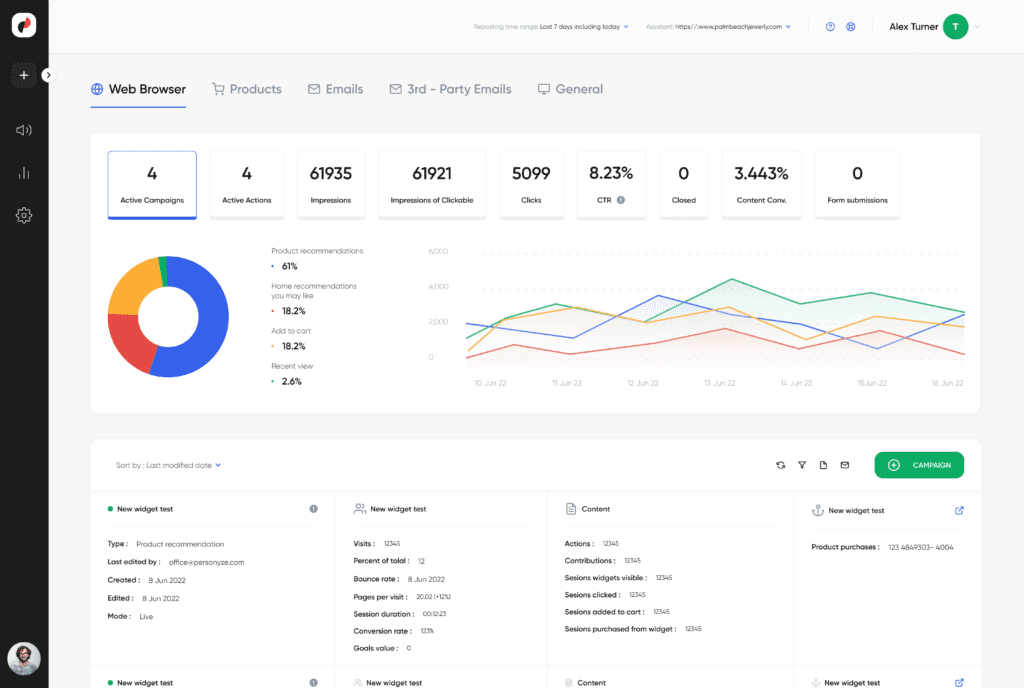
Detailed Reporting Dashboard
Personyze is automatically tracking views, impressions, clicks, and purchases, and can be set to track many more behaviors or sets of behaviors, all of which can be used as key metrics in A/B testing, displayed on a detailed reporting dashboard.
Personyze is integrated to Google Analytics out-of-the-box, and can further send analytic data to any third-party platform via pixels when someone views, clicks, or closes popups or banners.
Whatever key performance indicators you want to use, any sequence of behaviors on the site can be set in Personyze for tracking.
Set Personyze to track how much revenue your campaigns are contributing, by checking how many conversions were attributable to content provided by Personyze.
Content widgets
Personyze’s toolbox of widgets includes a WYSIWYG editor to change text, images, buttons, and other elements of your pages visually, or widgets to add new content to your site with ready-made templates, such as a banner and popup manager with various behaviors including trigger on site exit intent, and forms, timers, product and content recommendations, and more.
Dynamic content involves inserting things like user variables into your content. User variables are any data point that is known about the visitor that you might want to insert into a banner or popup, such as their first name, location, company name, or primary interest.
The content in your popup or banner can change based on variables, for instance it can say “Good morning,” or “Good evening,” depending on the time of day, or can have a totally different call to action based on the user’s role in their company, if known.
Personyze content such as popups or banners are completely customizable, and can even be set to inherit CSS styling from the page to get a head start on design. You can also directly edit the HTML of the popup, and/or insert your own HTML.
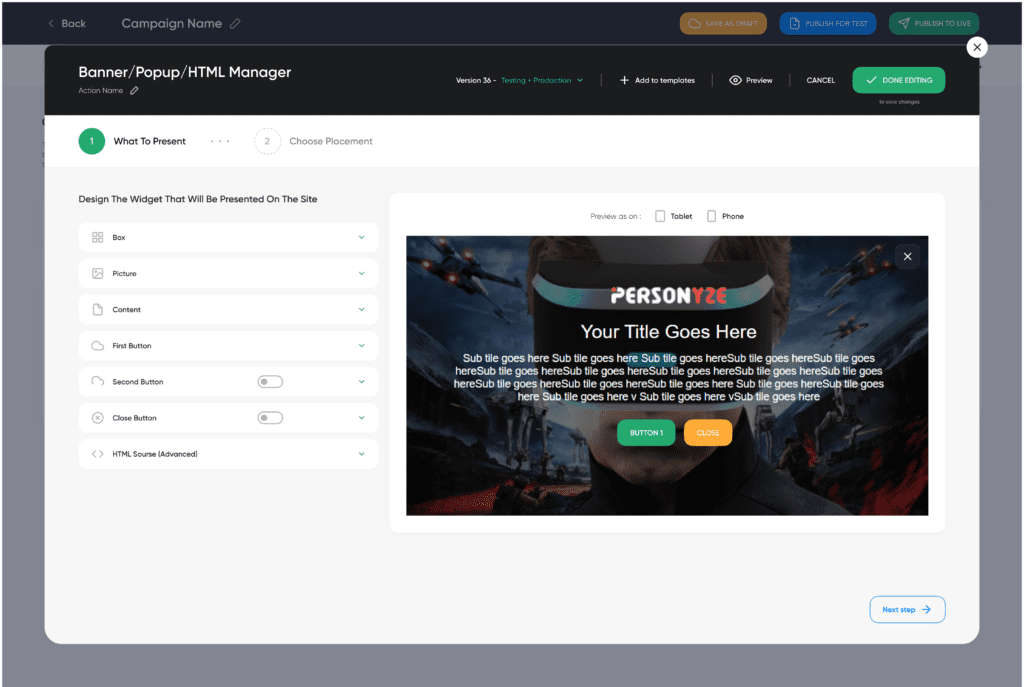
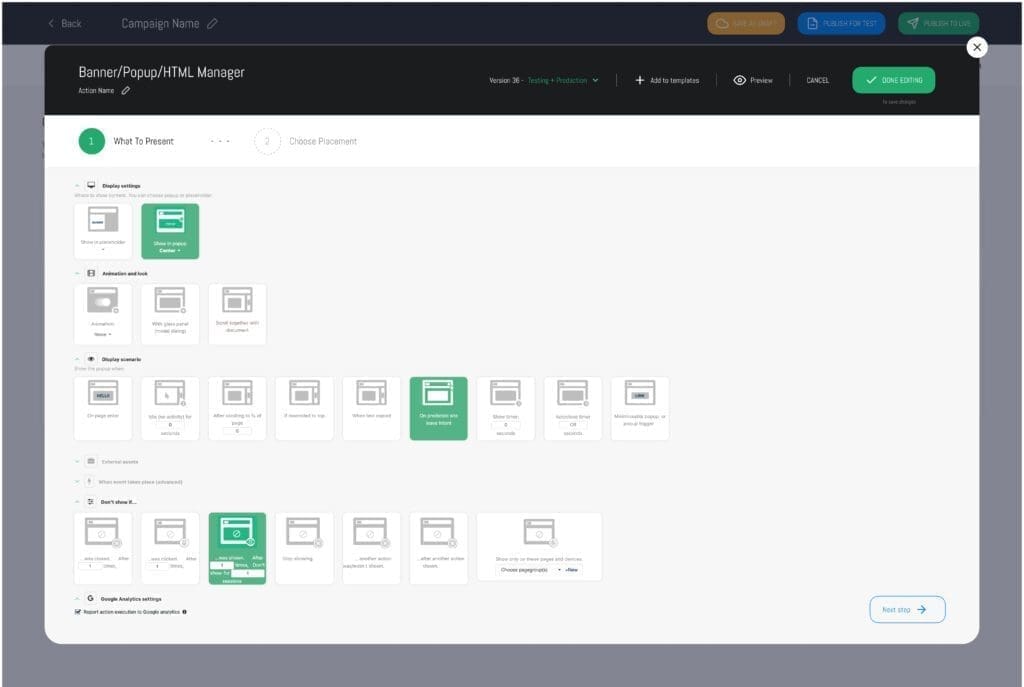
Display options
Any personalized content can be shown as embedded into the page, popup, replace existing content blocks on your site, or be called programmatically from your CMS via client-side or server-side API.
Popups in Personyze can have a variety of triggers for different purposes.
- Exit intent
When a shopper tries to leave the site, offer them a coupon to encourage them to check out. - On scroll X%
When a visitor scrolls a certain percentage of the way down the page, show a popup with the next piece of content to read. - When visitor is idle X seconds
Re-capture engagement when a user has been inactive on the page. - On text copy
Encourage shoppers to buy on your site rather than going elsewhere, when you detect they’re copying text. - Based on a timer
Draw more attention by showing a popup a few seconds after the visitor arrives. - On page enter
Show a popup as soon as the visitor arrives. - Re-scrolled to the top
Keep your visitor engaged with the next piece of content after they’ve completed reading and are going back to the top to look for something else. - On mouse hover
Show the popup only if the visitor shows interest in a particular topic or item by hovering their mouse over it. - Optional animations and glass panel
- Top/bottom bar
Show a popup in the form of a bar at the top or bottom of the page, such as to remind a customer that their coupon awaits them at checkout. - Minimizable popup
Show a popup that can be minimized and expanded. - Sticky top/bottom
Set a popup to always stick to the top or bottom of the page. - Placeholder
Show content such as banners in a given location on the page, embedded as if they’re part of the page. - Popup position
Popups can appear anywhere on the page, in all 9 quadrants. - Variety of popup content
Popups can contain countdowns, forms, recommendations, dynamic variables such as first name, and many more.
Set limitations on your popups, banners, and other content, so that it’s not shown more often than you want it to be, to avoid annoying your visitors.
You can set various special events such as JS, webhooks, or custom Google Analytics events when a visitor sees, clicks, or closes your popup or other content.
Wizards
Our step-by-step wizards guide you through the process of creating campaigns. Industry best practice responsive templates make the process even easier.
Verify before going live, with multiple tools to test, share with your colleagues, and analyze before publishing.
Wizards take what would otherwise be a complex set of tools and turn them into easy step-by-step processes, each tailored to one of the most common uses of the Personyze system.
Any content you create in Personyze can be saved in Personyze and used as a template, to be tweaked and adjusted for other segments or situations.
Personyze has responsive templates for banners, popups, forms, emails, and recommendation widgets.
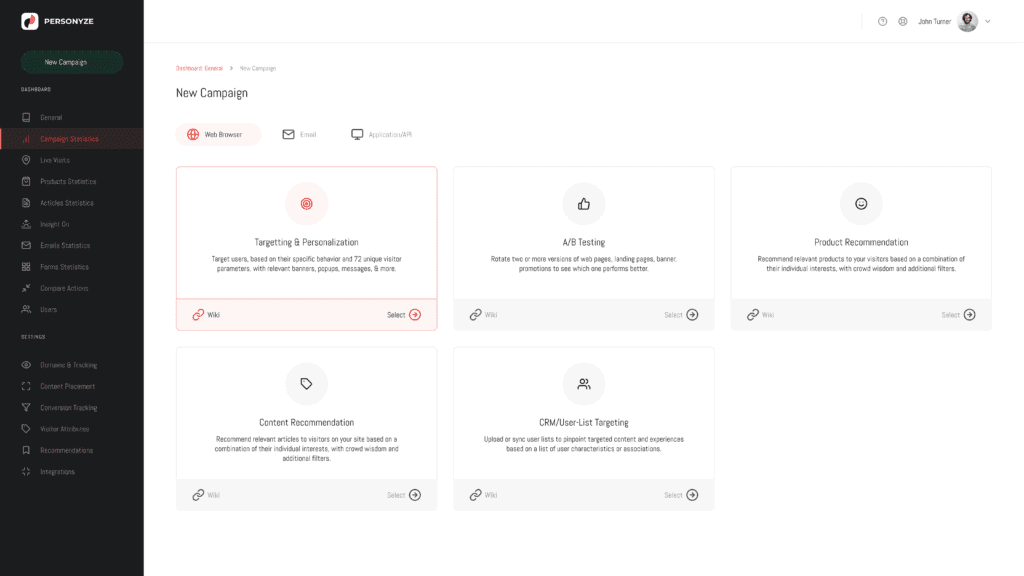
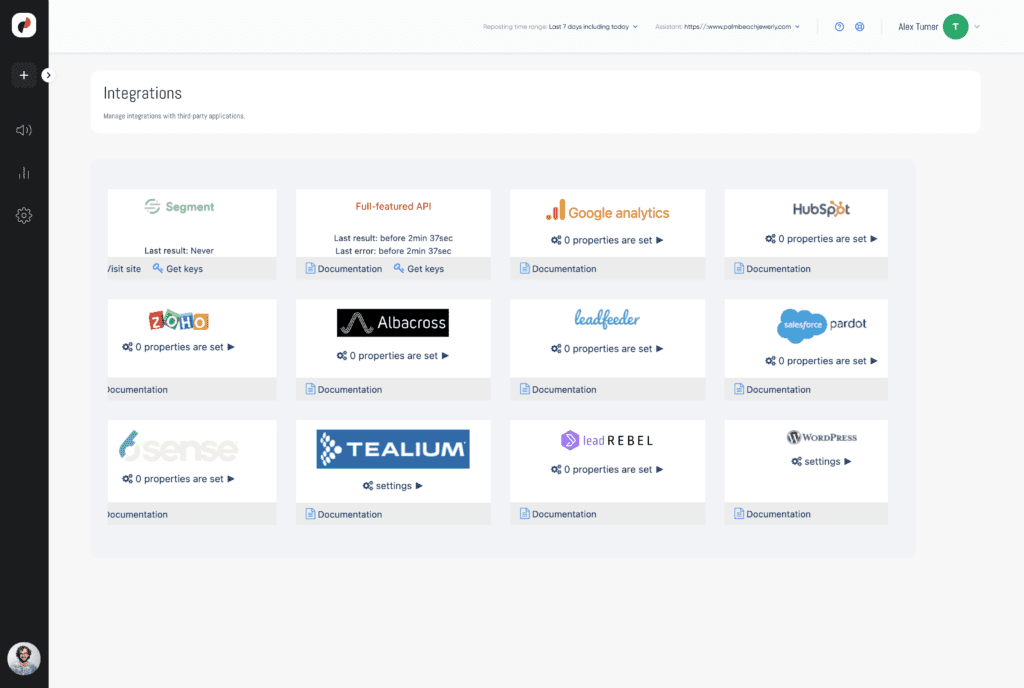
Integrations and data
Personyze is a hub where your data from various sources turns into automated personalization marketing in real time, allowing you to perform pinpoint targeting, using maximum data for AI-powered recommendations, inserting dynamic variables like company name into your content, and supporting complex workflow logic.
Set Personyze to track and immediately scrape any data that is entered into a given field, anywhere on your site. If the data exists on your site in some form, Personyze has access to it.
Personyze has a variety of third-party integrations out-of-the-box, plus the flexibility of data integration methods means that you can integrate data from virtually any source, via SFTP, file upload, RSS, API, or other methods.
There’s a good chance you have valuable data in your CRM that could be used for segmentation, and with Personyze, you can make it available so that you can target visitors based on CRM variables like stage in the funnel, lead scoring, or role in the company.
If you purchase data from an ABM data provider like Leadfeeder, Albacross, or ClearBit, Personyze can integrate it so that you can show custom content based on the industry, company size, or other ABM variables for key leads.
